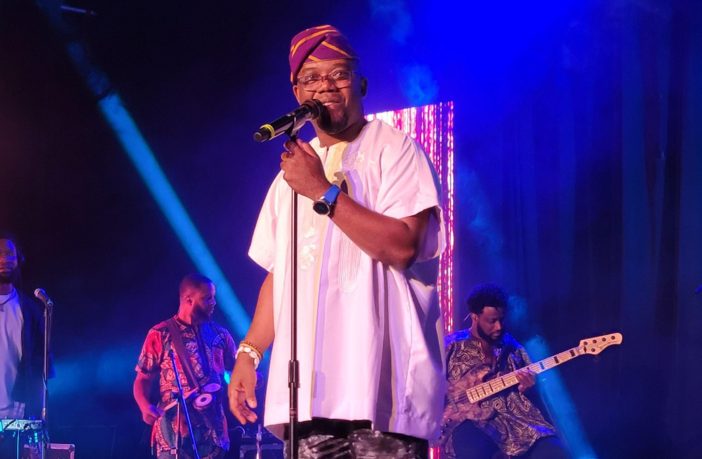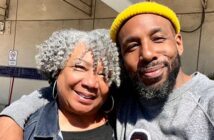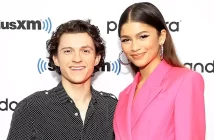A village square is said to be one of the most important spaces in rural communities. These venues, particularly in many African countries, serve as a market place to sell goods, discuss current affairs, tell stories and learn about cultural and traditional constructs that shape the community.
Local songwriter and musician, Babatunde Ogunseinde wanted to create a space where people all over the diaspora in Houston can come together, exchange ideas, learn about the arts and creatives in the community, while enjoying the smooth melodic sounds of Afrobeats music and Afro-centric performances.
The idea birthed the creation of The Village Square, a concert series dedicated to bringing the diaspora together through cultural music and the arts. His latest concert was hosted in Second Ward’s Talento Bilingue De Houston Center on April 22, showcasing the sounds of his native Yoruba Heritage along with other local artists including Lolade, Quincy Whetstone and Ayokunle Falomo. The show was produced by Houston’s Pan-African library SAiD Institute.
The Defender spoke with Ogunseinde about African Folklore, music and his contribution to amplifying the voices of the African diaspora.
Defender: Tell us more about the idea behind The Village Square.
Ogunseinde: The Village Square is like a city center where activity happens, exchanging of ideas, goods and services, political meetings, ceremonies and all of that. That’s where the idea came from. African culture should be elevated. I’m from Nigeria and that’s where I have the most access, but I want this (event) concept to expand to other cultures in the diaspora. This is not restricted to African cultures alone. This is the second time I’m putting on this event in Houston, but it’s the first time I’m doing it on a larger scale.
Defender: SAiD Institute was the executive producers of this show. Why were they a good fit for this cross collaboration?
Ogunseinde: I’m always bouncing ideas in my head every day. I always try to do different things. The first time I mentioned the concept of The Village Square was right before COVID-19 in 2019. SAiD is a huge partner in the actualization of this. They’re mission aligns with mine. Championing the voices of African people and the diaspora and finding ways to give back to our homeland. They make it priority to encourage community members to plan community events that will uplift us and they are such a vital resource to what I do here in the city.
Defender: What did you want people to take away from this experience?
Ogunseinde: I hope that non-Africans feel at home and embrace the culture, music and originality. For Africans, I want them to feel a sense of association and accomplishment and pride being able to identity with the music. A lot of people who attended haven’t been home to their native countries in a while, and I wanted to bring that feel of home to them.
Defender: How long have you been a musician?
Ogunseinde: I’ve been doing this professionally since 2008. Life happens and you tend to pivot, but I always found my way back to music. I moved to Houston from Nigeria in 2013, and wanted to continue my passion here. Before I left Nigeria, I did a regular show called “Babatunde and Friends” and wanted to continue that concept here. I realized organizing a show in the U.S. is a different ballgame and very expensive.
Defender: What were other major challenges you’ve faced as a musician?
Ogunseinde: A major challenge is that people don’t want to identify with our local language or music. My honest opinion. Afrobeats is finally hitting mainstream and that’s good, but I’ve had people say my music is too ‘local’. I’ve had a lot of critics say that my songs are too Yoruba and that I should consider mixing my songs with English. And I say no. If I’m Igbo, I will sing in that language, and if I’m Hausa, I will sing in the language. It’s a lot of pressure. My sound is Afro Folklore and Afro Soul and I’m going to stick to that. I’m all about telling stories and creating conversations through music.
Defender: Why is African folklore an important aspect to your music?
Ogunseinde: Before we knew who are, we were told who we are. It was passed down by our parents, and their parents, and many generations before. I was told about what village I was from before I could physically go there. I was born in another city in Nigeria. My father told me about my family tree, the meaning of my last name, my lineage. That is the importance of storytelling. Recording history and how it shapes our society. By the time I got to my village I could finally see the words told to me.
Defender: What lessons have you learned in this journey as a musician?
Ogunseinde: I’m too old to impress anyone. I’m here to make an impact not win a popularity contest, nor do I fit in a box. If the quality is good, people will come around. There will always be room for improvement and do your best not to compromise your sound and your integrity. There is a hunger I see that people desire this style of music and I’m going to keep exploring.



